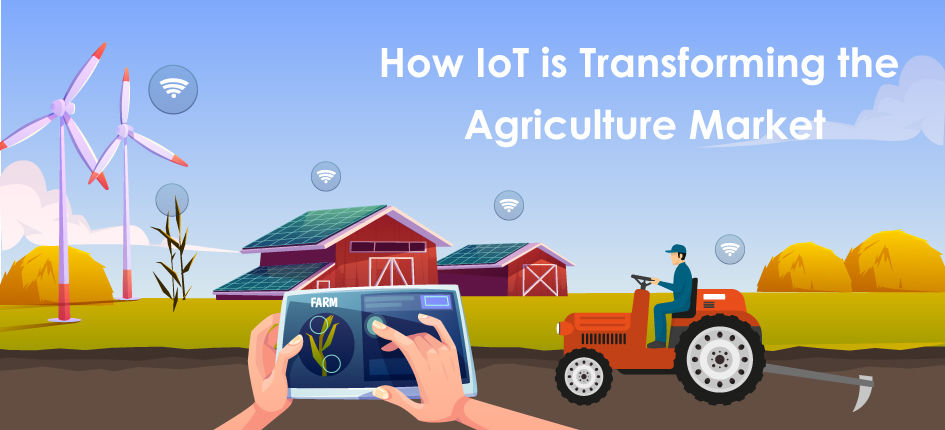How IoT is Transforming the Agriculture Market

Due to the mainstream adoption of the Internet of Things (IoT), connected devices have penetrated almost everywhere, right from energy, healthcare, home automation to retail, and the oil and gas industry. The impact of IoT has been observed in most sectors, and the sphere of agriculture is no different. It has brought forth a plethora of technological transformations in farming practices and tremendously improved every facet of agriculture. Now, farmers are less likely to rely on age-old techniques and use horses and plows for farming. By leveraging smart gadgets, they have gained more control over the process of growing crops and raising livestock, thus making their farming practices more predictable as well as efficient.
In this article, we will shed light on the benefits of IoT in the agriculture industry and explore its use cases to have an idea of how it is revolutionizing this industry. So, if you are planning for IoT mobile app development and embracing smart farming, dive right in.
How smart farming is levelling up the agriculture market
According to Business Insider, the IoT-enabled agriculture solutions will hit a milestone of 75M by 2020. Meanwhile, another report says that the global smart agriculture market will reach a massive amount of $15.3M by 2025. So, we can say that with the continuous evolvement of this market, the IoT mobile app development can help you to stand out as an early adopter and climb the ladder of success within the coming years.
Let’s have a look at the benefits of smart farming.
Deeper insights into internal operations
Smart agriculture sensors have the potential to gather tons of data about soil quality, weather conditions, cattle’s health, and crop growth progress. This data can give you deep insights into your staff performance, equipment efficiency, and thus, track the state of your business.
Better control over the internal processes
More control over the internal operations, lower will be the production risks. IoT products enable you to predict the outcome of your crops and plan for better distribution. If you know the volume of crops you are going to harvest, you can make sure that your product won’t lag behind and lie around unsold.
Cost management and waste reduction
The increased control over the production using the IoT solutions can help you to detect the anomalies in livestock health and crop growth. Hence, you can mitigate the risks of losing your yield.
Improve business efficiency
Smart farming solutions can allow you to automate multiple processes like irrigation, fertilizing, pest control, etc. across your crop production cycle and increase your productivity considerably. Automation can also help you to maintain high standards of your crop quality as well as growth capacity.
All these benefits can eventually improve your bottom line.
Now that you are aware of how IoT can benefit your farming, let’s have a look at the real-life implementation of IoT in the sphere of agriculture.
IoT use cases in agriculture
Climate monitoring
Weather stations combined with various sensors are probably one of the sought-after smart agriculture gadgets. They are generally placed across the field to garner a variety of data from the environment and send it to a cloud. The gathered data can be used to map the weather conditions, select appropriate crops and take necessary measures to enhance their capacity.
Greenhouse automation
Apart from collecting environmental data, weather stations have the potential to adjust the conditions according to the given parameters. Specifically, smart greenhouse automation systems work on a similar principle. Incorporating a smart sprinkler controller into your greenhouse system can allow you to manage your lighting and irrigation systems remotely.
Crop management
One more type of IoT-enabled product in agriculture and another element of smart farming is crop management devices. They should also be located in the field to gather data specific to crop farming. This data can range from precipitation and temperature to leaf water potential and crop health and help you to keep an eye on the growth of your crop and any anomalies to immediately prevent any infestations or diseases that can harm your product.
Cattle monitoring and management
Similar to crop monitoring, some sensors can be attached to the animals to examine their health and performance. Companies also use smart agriculture sensors to get an abundance of insightful data about the health, activities, and nutrition of each cattle as well as collect information about the herd.
Comprehensive farm management systems
Adopting farm productivity management solutions is the best approach to streamlining agricultural operations. These systems generally possess a number of IoT devices and sensors, installed on the field, as well as a robust dashboard having in-built analytical capabilities and reporting/accounting features. Such an end-to-end solution allows you to monitor and streamline most of your business operations remotely.
Final Words
Smart farming has become a necessity for agriculture businesses to thrive in this competitive world. With the high-quality IoT mobile app development, farmers can effectively cope up with all the challenges they encounter in their conventional farming practice. Additionally, the profound insights derived from sensors can help them to be more careful in their use of fertilizers and pesticides, thus mitigating hazardous environmental impacts.
In brief, correct IoT implementation in agriculture can address and overcome many challenges along with increasing the quality, quantity, and cost-effectiveness of agricultural production.

